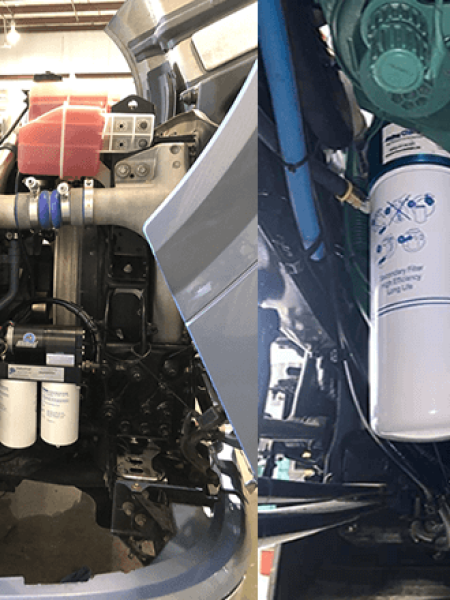

AirDog® has introduced an innovative water separator and filtration system for heavy-duty diesel fuel systems. Like all filtration systems, it’s necessary to change filters periodically. Knowing how to change your AirDog® fuel filters correctly is essential for maintaining a healthy and efficient fuel system in your diesel engine.
In this guide, we’ll take you step-by-step through the process of changing your filters – making filter replacement a breeze. Soon, your AirDog® filtration system will be running perfectly and ensuring you get the most from your heavy-duty diesel engine.
When it comes to heavy-duty diesel engines, some maintenance jobs are a lot easier than others. Changing AirDog® fuel filters definitely falls under the category of “easy.” As long as you are prepared with the proper supplies and follow the steps below, you can change your filters easily – even when you are out on the road.
In fact, we recommend all AirDog® users keep a spare set of filters in their trucks at all times. The need for a filter change can come at any time. If you want to ensure the optimal performance of your engine, keeping your AirDog® filtration system running right should be a top priority.
Before you dive in and start changing your filters, make sure you have the necessary tools and supplies ready. To change your AirDog® filters, you will need the following:
As you know, when performing maintenance on a heavy-duty vehicle, safety should always be your top priority.
Basic safety protocols when changing fuel filters include:
We especially want to emphasize the importance of changing your filters in a well-ventilated area. Our new water separator is an impressive improvement to our filtration system – but it does require you to fill it with diesel before installation. It’s a necessary step that should only be done in a well-ventilated area for safety reasons.
AirDog® provides high-quality water separators and fuel filters specifically designed for heavy-duty diesel systems. There are multiple different filter types designed for different systems, which means they are not one-size-fits-all. Make sure you have the correct replacement filters for your specific system before you take off your old filters.
For the water separator, AirDog® now offers a new model that includes a Hydrosorb media, ensuring efficient water removal and particulate filtration. Our original water separator already did an excellent job of keeping water out of your fuel and removing particulates. But our new water separator goes miles beyond the old one in terms of performance. That means your new replacement filter is going to perform better than ever!
It’s always a good idea to have everything ready before you start removing the filter. First, locate the existing AirDog® water separator and fuel filter. Next, have your replacement filters within easy reach. Finally, place a clean container beneath the filters to catch any fuel or residue that may drip during the process.
Removing both the water separator and the fuel filter requires a similar process. However there are a few differences due to how each filter works.
Before installation, pre-fill the new water separator with clean diesel fuel. This ensures the system is primed and ready to go, preventing the introduction of air into the system.
No need to pre-fill the fuel filter; simply ensure it’s clean and ready for installation.
Turn the key to the “ON” position (without starting the engine) and let the AirDog® pump run for about 30 seconds. This will prime the system and ensure that there are no air pockets in the fuel lines.
If your AirDog® system has an indicator light, monitor it closely. If it stays on for an extended period, it’s a sign that it’s time for a filter change.
As you can see, changing out your AirDog® fuel filters is easy and straightforward. There are only a few key points you need to keep in mind, like topping off the water separator with diesel before installation and priming the system. Otherwise, it’s much like any other filter change. Pretty much anyone can do it, and it is a quick job in most cases.
And remember, dispose of used filters responsibly! One of the great things about AirDog® fuel filters is their ability to improve fuel efficiency and, therefore, reduce the environmental impact of operating heavy-duty diesel engines. Proper filter disposal is also an important part of reducing environmental impact. It also protects you from potential fines for improper disposal, which can be significant depending on your location.
Keep your heavy-duty diesel engine performing at its best with regular filter changes. And keep a set of spare filters in your truck for unexpected situations.
If you have any questions, please let us know. The team at AirDog® is standing by to assist you!